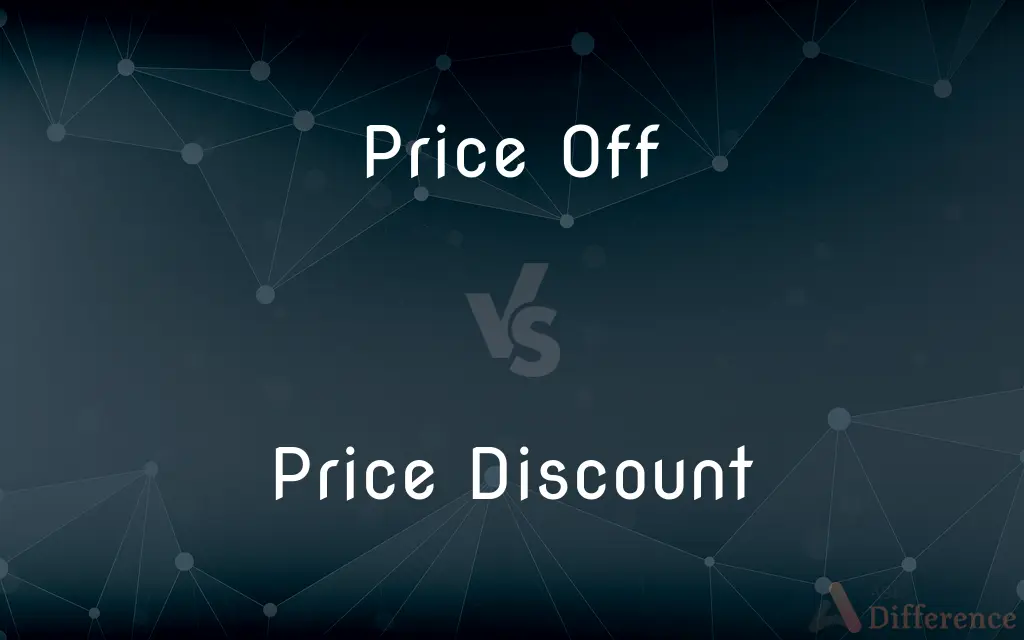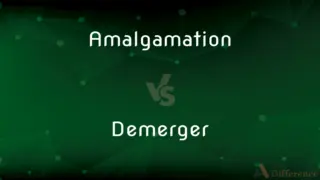Price Off vs. Price Discount — What's the Difference?
By Tayyaba Rehman — Published on December 14, 2023
"Price off" usually means a specific amount reduced from the original price, while "price discount" refers to a reduction, often a percentage, from the original price.

Difference Between Price Off and Price Discount
Table of Contents
ADVERTISEMENT
Key Differences
"Price off" typically indicates a direct monetary reduction from the standard price, say "$5 off." In contrast, "price discount" often refers to a percentage reduction, for instance, "10% discount," and may not always disclose the exact monetary value upfront.
In marketing, "price off" is a term that suggests an immediate and tangible benefit to the consumer, as it presents the exact amount they would save. On the other hand, a "price discount" might require consumers to calculate the actual saving themselves, which can create a psychological allure by making them process the perceived savings.
"Price off" promotions are straightforward and easy for consumers to understand because they provide a specific amount of savings. "Price discounts," however, can be more attractive to consumers who enjoy calculating potential savings and feel they are obtaining a larger benefit, especially when the percentage represents a substantial monetary value.
The term "price off" is usually fixed and doesn't change based on the quantity purchased. In contrast, "price discount" can be flexible, such as volume discounts where the percentage off increases with the number of items bought.
Both "price off" and "price discount" strategies are used in sales to stimulate customer purchases. However, "price off" deals are generally perceived as more straightforward, while "price discounts" can sometimes convey higher value, especially for higher-priced items where a percentage equates to a significant dollar amount.
ADVERTISEMENT
Comparison Chart
Nature of Reduction
Specific monetary amount
Often a percentage
Calculation
No calculation required
May require calculation
Psychological Effect
Direct, tangible benefit
Perceived higher value
Flexibility
Usually fixed
Can be flexible
Usage in Sales
Simplicity, immediate saving
Perceived larger savings, allure
Compare with Definitions
Price Off
A fixed amount deducted from the original cost.
The $5 price off made it affordable.
Price Discount
A promotional strategy reducing the item's cost.
The price discount attracted more customers.
Price Off
A specific monetary discount on an item.
The sticker shows a price off of $10.
Price Discount
A percentage off the initial price.
The 10% price discount applied to every item in the cart.
Price Off
A set discount amount on a product's price.
I bought it with a $30 price off.
Price Discount
A reduction in price, usually a percentage.
A 25% price discount is available store-wide.
Price Off
A direct reduction in price.
With $20 price off, it's a deal!
Price Discount
A deal or offer that reduces the original price.
Thanks to the price discount, I saved a lot!
Price Off
Immediate savings in monetary form.
The price off was reflected at checkout.
Price Discount
A markdown from the original price.
The store offered a price discount on select items.
Common Curiosities
Is "price off" the same as "price discount"?
They're similar but not the same; "price off" is a specific amount off, while "price discount" is often a percentage.
Can "price discount" refer to both percentage and specific amount reductions?
Generally, yes, but it commonly refers to percentage reductions.
Is "price off" more straightforward for consumers?
Yes, "price off" offers a direct understanding of the amount saved.
Are "price off" promotions less common than "price discounts"?
Not necessarily; it depends on the retailer's marketing strategy.
Which is more effective, "price off" or "price discount"?
It varies based on the context and the target audience's preferences.
Why might a retailer prefer "price discount" strategies?
They might perceive it as offering higher perceived value, encouraging more sales.
Does "price discount" always require calculation from customers?
Often, yes, especially when the discount is in percentage form.
Are "price off" and "price discount" terms used globally?
Yes, they're commonly used in retail worldwide.
Are there specific times when "price off" offers are more prevalent?
They're often used for clearances or specific item promotions.
Can a "price off" be a form of "price discount"?
Yes, it's a type of price discount, but specified in a fixed amount.
Do "price off" and "price discount" affect consumer psychology differently?
Yes, "price off" provides direct savings, while "price discount" can create a sense of greater value.
Do "price off" and "price discount" have different impacts on sales?
The impact varies, but both strategies aim to boost sales by offering savings.
How do retailers decide whether to offer a "price off" or a "price discount"?
It depends on various factors like the product, market strategy, and consumer behavior.
Can both "price off" and "price discount" be offered simultaneously?
It's unusual, as it can confuse consumers, but possible with clear communication.
Are "price off" and "price discount" the only discount types available?
No, there are various discount strategies, including loyalty discounts, seasonal discounts, and more.
Share Your Discovery

Previous Comparison
Amalgamation vs. Demerger
Next Comparison
Cisco SNT vs. Cisco SNTPAuthor Spotlight
Written by
Tayyaba RehmanTayyaba Rehman is a distinguished writer, currently serving as a primary contributor to askdifference.com. As a researcher in semantics and etymology, Tayyaba's passion for the complexity of languages and their distinctions has found a perfect home on the platform. Tayyaba delves into the intricacies of language, distinguishing between commonly confused words and phrases, thereby providing clarity for readers worldwide.












































